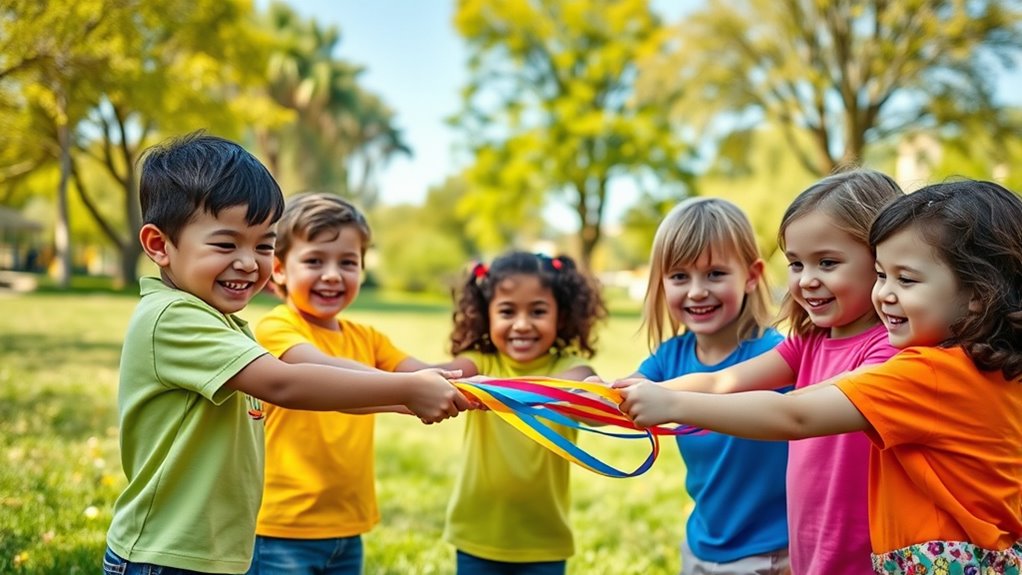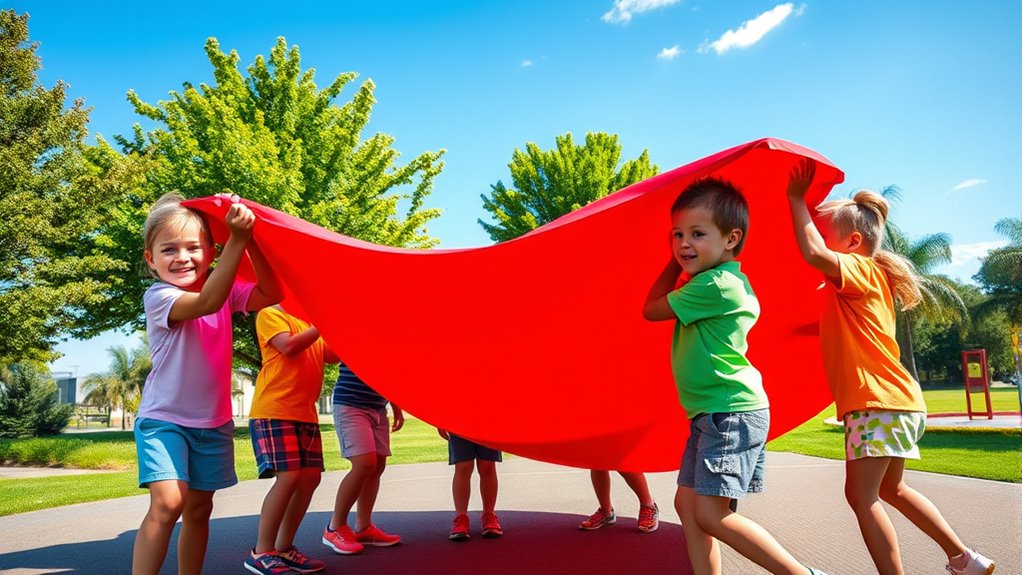Cooperative games for preschoolers focus on fostering social skills, teamwork, and emotional growth while having fun. Activities like parachute play or “All Aboard” encourage sharing, listening, and mutual support without emphasizing winning. These games help children develop patience, empathy, and problem-solving abilities in a supportive environment. By promoting inclusive participation, you’ll see their confidence and positive attitude grow. Keep exploring to discover more engaging ideas to support your child’s social development.
Key Takeaways
- Promote social skills like sharing, listening, and teamwork through engaging, age-appropriate activities.
- Include games such as “All Aboard” and parachute play that emphasize cooperation over competition.
- Focus on fostering communication, patience, and empathy among preschoolers during group activities.
- Use simple, minimal-material games that encourage inclusivity and active participation.
- Support emotional growth and resilience by celebrating shared successes and encouraging positive interactions.

Cooperative games are a fantastic way to help preschoolers develop important social skills while having fun. These games encourage young children to work together toward a common goal, fostering a sense of teamwork and camaraderie. As you introduce these activities, you’ll notice how they naturally promote team building, which is essential at this developmental stage. When children collaborate, they learn to communicate their ideas clearly, listen actively, and respect each other’s contributions. These interactions lay a solid foundation for their social skills, helping them navigate relationships now and in the future.
Cooperative games build social skills, teamwork, and communication in preschoolers while they have fun together.
By engaging preschoolers in cooperative games, you give them opportunities to practice patience and empathy. For instance, when they share materials or take turns during a game, they experience firsthand what it means to be considerate of others’ needs. This kind of shared experience teaches them about fairness and compromise. As they celebrate successes together or learn to handle setbacks without frustration, they develop resilience and a positive attitude toward teamwork. Over time, these social skills become ingrained, making group activities less intimidating and more enjoyable for children.
You’ll find that cooperative games also boost children’s confidence. When they realize they can contribute meaningfully to a group effort, they feel more valued and capable. This sense of achievement encourages them to participate actively, which further reinforces their social skills. Plus, these games often involve problem-solving scenarios that require children to communicate, brainstorm, and agree on solutions collectively. Such activities sharpen their ability to negotiate and reach consensus, key components of effective social interaction.
Implementing these games is simple. You can start with classic activities like “All Aboard” (where children must work together to move across a room on a shared mat) or “Parachute Play,” where everyone holds the edges and cooperates to create waves or bounce balls. These games are adaptable for different age groups and skill levels, and they’re easy to set up with minimal materials. As you facilitate, emphasize the importance of listening, sharing, and supporting each other. Reinforce that winning isn’t the goal; rather, the focus is on teamwork and enjoying the process together. Additionally, incorporating educational concepts into play can deepen their understanding of social dynamics and cooperation.

Peaceable Kingdom Count Your Chickens Award Winning Cooperative Counting Game for Kids
Count Your Chickens is the award winning cooperative counting game with pluck!
As an affiliate, we earn on qualifying purchases.
As an affiliate, we earn on qualifying purchases.
Frequently Asked Questions
How Do Cooperative Games Benefit Preschoolers’ Social Development?
You help preschoolers build social skills and emotional regulation through cooperative games by encouraging teamwork and communication. As they work together, they learn to share, take turns, and resolve conflicts effectively. These games also teach kids how to manage their emotions, stay patient, and celebrate others’ successes. By participating actively, preschoolers develop important social and emotional skills that lay a strong foundation for positive interactions throughout their lives.
What Are Some Easy-To-Organize Cooperative Games for Outdoor Play?
You can organize relay races and treasure hunts easily for outdoor play. For relay races, set up a simple course where kids pass a baton or object, encouraging teamwork. For treasure hunts, hide small items and give clues, promoting cooperation. Both games are fun, engaging, and foster social skills like sharing, communication, and teamwork, making outdoor play both active and educational for preschoolers.
How Can Parents Encourage Teamwork During Cooperative Games?
You can encourage teamwork by gently guiding your child to build trust and practice sharing during games. Praise their efforts when they cooperate, and model positive behavior yourself. Encourage friendly communication, listen actively, and celebrate team successes. By fostering an environment of understanding and patience, you help preschoolers feel safe to work together, making the experience enjoyable and natural. This gentle approach nurtures teamwork and helps your child develop strong social skills.
Are Cooperative Games Suitable for Children With Special Needs?
Yes, cooperative games are suitable for children with special needs when you incorporate adaptive participation and inclusive strategies. You can modify rules, provide visual cues, or offer extra support to guarantee everyone can participate and feel successful. By focusing on inclusion, you help children build social skills and confidence. Always observe individual needs and adjust the game to foster a positive, engaging, and accessible experience for all children involved.
How to Modify Cooperative Games for Mixed Age Groups?
Think of your game as a garden where different plants thrive together. You can adapt cooperative games for mixed ages by using age-appropriate modifications, like adjusting rules or providing different roles. Inclusivity strategies, such as pairing older children with younger ones or offering varied challenges, help guarantee everyone feels involved. This approach nurtures teamwork across ages, creating a vibrant, supportive environment where every child blooms.

Nvatorfox 6ft Rainbow Parachute, Play Parachute Toy for Kids, Parachute with Handles Indoor & Outdoor Play Equipment
【Parachute Size】6-feet diameter, 8 separate handles spaced evenly around for group play(Teach turn-taking and cooperation)
As an affiliate, we earn on qualifying purchases.
As an affiliate, we earn on qualifying purchases.
Conclusion
By trying out these cooperative games, you’re planting seeds of teamwork and kindness in your preschooler’s heart. Remember, two heads are better than one, and fostering these skills early on makes a lasting impact. When your child learns to work together, they’ll realize that the whole is greater than the sum of its parts. So, don’t wait for a perfect moment—dive in and watch them grow stronger and more compassionate every day.

Chuckle & Roar Alphabet Matching Memory Game for Kids Ages 3+ – Preschool Letter Matching Board Game for Toddlers, Uppercase & Lowercase ABC Learning Game
Alphabet Learning Memory Game: Helps kids learn uppercase and lowercase letters by matching ABCs with corresponding illustrations in…
As an affiliate, we earn on qualifying purchases.
As an affiliate, we earn on qualifying purchases.

Soulchen 13 Pcs Team Building Game with Buckets and Balls Set Family Fun Group Games Challenge Outdoor Team Building Activities for Game Sports Day Activity Family Night or Party (Blue)
Team Building Game Set: there are 8 pieces of blue drawstrings, 1 folding bucket, 3 tennis balls and…
As an affiliate, we earn on qualifying purchases.
As an affiliate, we earn on qualifying purchases.









